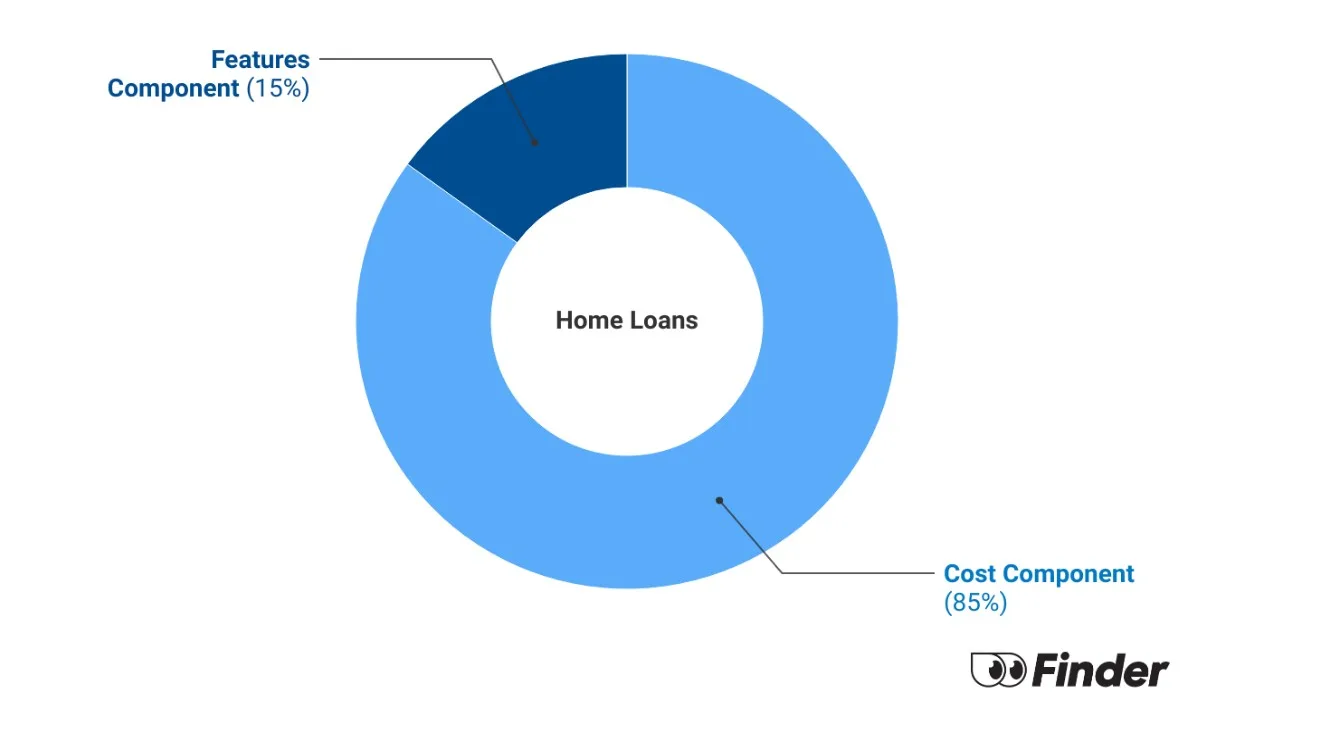Compare other products
We currently don't have that product, but here are others to consider:
How we picked theseKey takeaways
- The lowest interest rate on the market this month is a 3-year fixed rate of 4.85%.
- You could save $6,720 a year by switching from the average variable rate to the cheapest variable rate of 5.14%.
- If you're a first home buyer you may be able to get a cheaper interest rate of 4.99%.
- The cheapest rate might not be the best loan: look out for fees and features, and remember you might end up with a higher rate if you want to borrow above 80% of the property value.
How to compare the cheapest home loan rates
You’d think it was as simple as looking at the lowest number in the table, right? Well, it can be. But there are some things to watch out for that could make your cheap home loan…not so cheap.
1. Ok yes, look at the rate
The starting point is to always look at the rate. The lower rate, the lower your repayments.
2. But then look at the fees
Some loans lure you in with a cheap attractive rate, but then you find it piles on a huge fee to apply and another fee to pay each month as well. Your cheap rate now costs you more per month than the slightly higher interest rate with no fees.
3. Then have a little glance at the comparison rate
Comparison rates are normally based on loans of $150,000 so they’re not always helpful. But if the comparison rate is much higher than the actual interest rate, you can bet there are other costs driving your repayments up.
4. Don't forget to look at the features
It’s all well and good getting a low interest rate but if you’re sacrificing access to features that could save you money in the long run, it’s not worth it. Take an offset account, for example. Using an offset account will mean you pay down the loan faster because it reduces the amount of interest you need to pay.
Is your rate the cheapest rate?
The lower the interest rate the lower the repayments
The number one factor in determining a cheaper home loan is a low interest rate.
Let's compare 2 otherwise identical home loans with slightly different interest rates.*
| Interest rate | 6.41% | 5.14% |
|---|---|---|
| Loan amount | $693,802 | $693,802 |
| Loan term | 30 years | 30 years |
| Monthly repayment | $4,345 | $3,785 |
| Monthly saving | N/A | $560 |
| Annual saving | N/A | $6,720 |
As you can see, with the lower interest rate, you save $560 a month – or $6,720 a year.
*We're using the average owner-occupier home loan size from the ABS, the average variable rate loan in Finder's database of the full market and the lowest variable rate available for refinancers.
How much can you save with a cheaper home loan?
We calculated this by using our loan repayment calculator. Try it out for yourself and see how much you could save.
What are the lowest home loan rates on the market?
Every month, we analyse the rates in our database to create a list of the market's cheapest loans.
The lowest variable interest rate in Finder’s database is 5.09% This rate is available for first home buyers only.
The lowest fixed interest rate in Finder’s database is 4.98%
The cheapest rates over time.
What are the cheapest home loans at the big 4 in February 2026?
Interest rates can change depending on your circumstances, but as a guide, here are the cheapest home loans from the big 4.
| Bank | Cheapest Fixed Rate | Cheapest Variable Rate |
|---|---|---|
| ANZ | 5.44% | 5.5% |
| CBA | 5.79% | 5.34% |
| NAB | 5.74% | 5.69% |
| Westpac | 5.49% | 5.64% |

"I wanted to make sure I have one of the cheapest home loans on the market. So I found an online lender with a consistently low interest rate (I should know, I check rates every month). But I also made the sure the loan had an offset account. For me, being able to build up savings in the offset account speeds up my loan and cuts down my overall interest charges dramatically. This makes the loan much cheaper in the long run."
What to look for in a cheap home loan
At a very basic level, the cheapest home loan is the one with the lowest rate. But every borrower has different needs. So beyond a low rate, you need to get a loan that actually helps you achieve your property goals and financial needs.
A loan you can pay off ASAP
Home loans are normally taken out for 30 years, but the sooner you can repay the more you'll save! Most variable rate home loans allow you to make extra repayments and pay the loan early.
Fixed rate loans are less likely to allow extra repayments and will probably charge a break fee if you do repay early.
A loan that matches your strategy
The cheapest home loans are likely owner-occupier loans, but if you're buying an investment property they won't help you. You might also want an interest-only loan for the tax benefits if you're an investor.
A loan with an offset account
The money you'll save by using an offset account may very well mean you end up paying less than if you went for a lower rate without an offset account. Check out our guide on offset accounts to see if it could help you.

"If I had to credit just one thing with helping me repay my home loan in just 7 years, I'd say it was an offset account. This is a debt-busting secret weapon. You should keep every cent to your name in one of these – we're talking your savings for everything, your emergency cash stash and even your salary. You'll likely save tens of thousands of dollars and shave years off your time in debt."
3 extra tips to help you save money on your home loan
1. Choose your loan term carefully
Most borrowers choose 30-year loan terms.
If you picked a shorter loan term your monthly repayments would be higher, but you'd pay off your loan 5 years earlier, saving thousands in interest.
Let's look at 3 examples where the loan term changes:
| Loan term | 30 years | 25 years | 20 years |
|---|---|---|---|
| Interest rate | 5.50% | 5.50% | 5.50% |
| Loan amount | $600,000 | $600,000 | $600,000 |
| Monthly repayment | $3,407 | $3,685 | $4,128 |
| Total cost* | $1,226,425 | $1,105,358 | $990,558 |
*Total cost here refers to the amount of interest you pay over the life of the loan, plus the principal.
2. Find a loan with lower fees
Some lenders charge multiple loan fees that can add up to hundreds of dollars. But other lenders charge basically no fees at all (you still have to pay government fees like a mortgage registration fee).
If 2 loans have identical interest rates and features, the one with fewer fees will be the cheapest home loan.
3. Save a bigger deposit
Easier said than done, of course. But saving a bigger deposit means borrowing less money. And that instantly makes your home loan cheaper.
It saves you money in other ways too:
- You can avoid lenders mortgage insurance. LMI is paid if you have less than a 20% deposit.
- You can unlock lower rates. Many lenders offer lower interest rates for borrowers with a deposit of 20% or more.
Watch: How to find a lower home loan rate

Why you can trust Finder's home loan experts
 Let us do the talking - we spoke to heaps of experts, brokers, banks and real humans to put 20+ hours into this guide. Our editors regularly talk to buyers, refinancers, investors and every one in-between to keep this information useful.
Let us do the talking - we spoke to heaps of experts, brokers, banks and real humans to put 20+ hours into this guide. Our editors regularly talk to buyers, refinancers, investors and every one in-between to keep this information useful.
 Rates obsessed - We track big banks, small banks, credit unions and digital banks because even 1 decimal place could save you big bucks (without getting annoying calls!).
Rates obsessed - We track big banks, small banks, credit unions and digital banks because even 1 decimal place could save you big bucks (without getting annoying calls!).
 Ready when you need it - Lending rates verified from 180+ products day and night. Whether you've remembered you need to refinance at 3am or live at an auction - our rates are up-to-date.
Ready when you need it - Lending rates verified from 180+ products day and night. Whether you've remembered you need to refinance at 3am or live at an auction - our rates are up-to-date.
Frequently asked questions about getting a cheap home loan
What is Finder Score?
The Finder Score crunches 7,000 home loans across 120+ lenders. It takes into account the product's interest rate, fees and features, as well as the type of loan eg investor, variable, fixed rate - this gives you a simple score out of 10.
To provide a Score, we compare like-for-like loans. So if you're comparing the best home loans for cashback, you can see how each home loan stacks up against other home loans with the same borrower type, rate type and repayment type. We also take into consideration the amount of cashback offered when calculating the Score so you can tell if it's really worth it.
Sources
More guides on Finder
-
Home loan cashback offers
Home loan cashback deals can help you refinance to a cheaper interest rate and get a lump sum cash payment. Compare the latest deals and check your eligibility today.
-
A guide for first home buyers
Use our complete first home buyer guide to make your first home purchase as stress-free as possible.
-
South West Slopes Bank home loans
A community credit union operating in the south west country area of NSW, helping you find the right home loan.
-
The Capricornian home loans
Compare home loan rates from The Capricornian, a credit union in Central Queensland.
-
Greater Bank home loans
Check out home loans from Greater Bank and apply today.
-
ME home loans
ME is an online lender with a simple range of products, including the Basic Home Loan and the Flexible Home Loan. See their rates and fees here.
-
ING home loans
Thinking about getting a home loan from ING? Compare rates and learn more about this lender.
-
loans.com.au home loans
loans.com.au is one of Australia's leading online only lenders with a range of products that have great features and low costs.
-
Community First Bank home loans
Community First Bank is a credit union that offers home loans in addition to other financial products.
-
Best Home Loan Rates Australia
Learn how to compare rates to find the best home loan and start saving money on your mortgage today.


